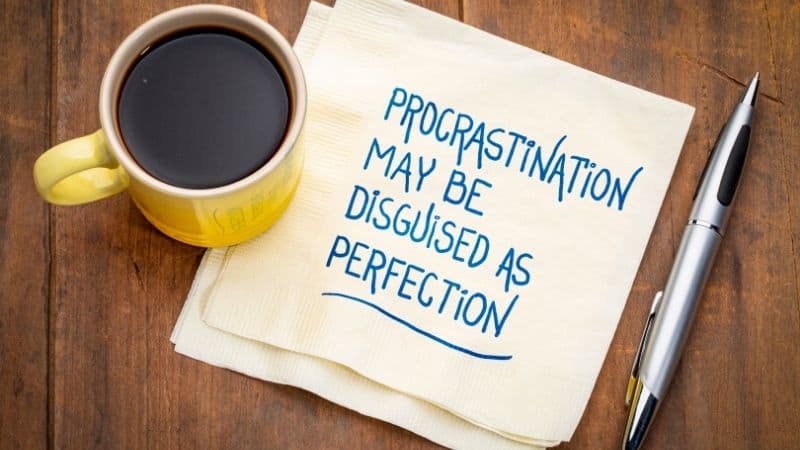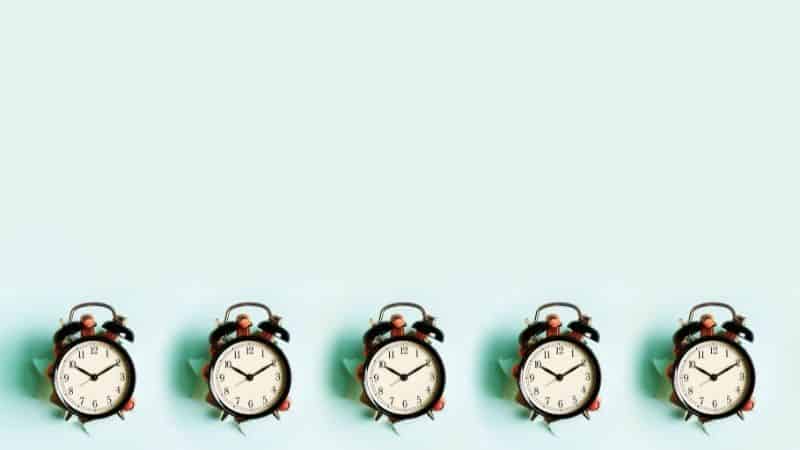Procrastination doesn’t look dangerous at first, but it quietly steals your biggest goals until “tomorrow” becomes a habit you can’t trust. In this article, Jef Menguin shares what procrastination really is and how to stop it with small actions that build discipline over time. Apply the shift and share it with your team so you create a culture that starts now, not later.
Procrastination is a silent dream killer. It steals from you, without your notice, your big and most important goals. Don’t let opportunities slip away. Act now and achieve your biggest goals.
Procrastination, if unchecked, turns into “Mamaya na” or Mañana Habit. It will bind you and me to a life of mediocrity, shame, and guilt. If we don’t stop procrastination, we will be sabotaging our success. But if we will act on it, we will be free.
Procrastination is a very misunderstood topic. Very few people who procrastinate think that they are procrastinators, which is not a bad thing.
What is procrastination?
Procrastination is delaying until tomorrow the important things or difficult work we can do today. It is normal for us human beings to avoid what we perceive and feel to be challenging situations. Our brains make us avoid “danger”, so it finds excuses by making us do things that are easy or pleasurable. We procrastinate to escape or avoid because of fear. It is an instinct that when left unchecked turns into a destructive and unproductive habit.
Based on this simple definition, procrastination is more of a problem with how to manage emotion than how to manage time. It is not the cause of laziness too. I will explore more of these ideas in future articles.
You can replace a bad habit with a good habit. You can turn a good habit into discipline. Good habits and discipline are cures to procrastination.
Filipinos are very much familiar with Mañana or Mamaya Na Habit. The problem with tomorrow is that it never comes. So, we delay our work until it is too late. Learn more about Manana Habit.
When we were children, many of us told our parents that we would do our chores “mamaya na” or later. Procrastination is part of our growing up. Unfortunately, many of us still procrastinate now that we are professionals.
I started my research about procrastination because I procrastinated a lot about things.
For example, it took me 30 years before I started writing my first book. Yet, I finished writing that book in 15 days. Yes, I finished writing a book in 15 days though I failed to begin for 30 years. That experience of writing a book showed me the impact of procrastination on my happiness.
But I still procrastinate. Most people do, occasionally.

I wished I had learned in school how to let go of procrastination.
Very few of us identify ourselves as a procrastinator. But most of us, if not all, are occasional procrastinators. I want to help.
I created courses, workshops, and webinars to serve as valuable resources to leaders.
Filipinos have a way of describing procrastination. We call it “Mamaya Na Habit.” Mamaya na is a Tagalog phrase that means later.
The expressions used are
- mamaya na
- bukas na
- saka na
Procrastination sa Tagalog
Ang mga katagang mamaya na, bukas na, at saka na ay mga nagpapahayag ng pagpapaliban. Ang ibig sabihin ng procrastination ay pagpapaliban.
Karaniwan, kapag inuutusan ang mga anak, ang madalas na sagot ay mamaya na. At walang katapusan ang mamaya na. Mamaya na ang pinakasikat na kasing-kahulugan ng procrastination.
Ang salitang bukas na ang pinakamalapit sa pinanggalingang salita sa Latin. Katulad ng mamaya na, hindi rin nauubos ang bukas na.
May kasabihan sa wikang Filipino na nagsasabing, “wag na ipagpabukas ang maaring gawin ngayon.”
Ang salitang saka na ay hindi mamaya na o bukas na. Wala itong tiyak na oras o araw.
Ang taong mahilig magpaliban ng gawain ay hindi tinatawag na mapagpaliban. Ang karaniwang tawag sa kanila ay tamad.
Gayunpaman, hindi lahat ng procrastinator ay tamad.
Mamaya na, bukas na, and saka na are three phrases used to express the intention to delay actions.
Typically, when parents asked their children to do chores, kids answer mamaya na. This means that they’ll do things later. But later does not become now. Mamaya na is the most popular translation for procrastination.
The phrase bukas na is the closest translation to Latin origin. Bukas na means tomorrow (morning). Bukas na is always the next day.
There is a Filipino saying that goes, “Don’t put off until tomorrow what you can do today.”
The phrase saka na has no specific hour or date. It may mean that things might be done some other time.
People who keep putting off things are not called procrastinators in the Philippines. They are considered lazy.
But as you will learn in this guide, not all procrastinators are lazy.
Bad Effects of Procrastination
Most people don’t see the effect of procrastination in their lives. Most of the bad effects we associate with it are emotional and mental.
People don’t see the money they lost because of delayed actions.
People don’t see the opportunities that won’t come back because of their wait-and-see attitude.
Procrastination delays success.
In 2004, I joined a Toastmasters club whose members meet every Monday evening.
It was a common experience for us to delay preparing for the speech until Monday morning. Speakers are assigned their roles right after the meeting. We start thinking about our topics by next Tuesday morning.
Finding a good topic takes time. Most of us cannot start writing a speech if we are not sure of the subject. Yes, we must write the speech and rehearse it. Then, we must perform.
Procrastinating Affects Mental Health
Procrastination reduces mental health, increases our stress, and lowers our well-being. Procrastinating about small things may not have any impact at all. It comes with life.
Catherine
Catherine, for example, was late in the submission of work requirements. Unfortunately, the boss did not accept the requirement for it was 8 minutes late. I know, we can say that the boss is just power-tripping. But the failure to submit on time caused her much stress because it resulted in her disqualification for promotion. She did not receive her bonus too.
Mario the Money Sender
Mario took time before sending the money her mother needed for hospitalization. His excuses were that he had no time yet to send the money for he was very busy. He did not know that it was very urgent. Her mother died and he blamed himself for it. His guilt was too strong that he started isolating himself from others, and got depressed. There are many reasons why her mother died, but he blamed his procrastination for her death.
Divine the student.
Divine is a high school student. Her teacher gave the class two weeks to work on a project. Her stress level grew as she thought about the project. She said that the project was difficult and she did not know how to start. So, she did other things instead. But each day, she got more afraid of the possibility of failing.
Two days before the submission of the project, she did not attend all her classes, stayed in her room, and work on the project. She blamed herself and those who made her procrastinate. She cried bucketfuls of tears. She got no sleep. She finished the project.
When asked about the experience, she said that she hated her teacher for it.
Delayed actions may have different results. The same results may have different impacts on the individual. How we see the impact of our actions is what affects our mental health.
What Science Tells Us About Procrastination
Many misconceptions surround procrastination, often over-simplifying it as mere laziness or a character flaw. I once met someone who believed he was born a procrastinator.
When I was teaching, I got dozens of explanations (excuses) from students too. In many of my time management workshops, I encountered participants who said that they procrastinate they can do better when they are cramming (not true!).
Science has offered us valuable perspectives to better understand and manage this procrastination. Here’s what researchers have discovered and how their findings can guide us towards productive habits.
Before that, please note that though we call this science, none of these scientific studies can singlehandedly explain why we procrastinate. We are not lab rats. Our experiences differ too.
Executive Functions and Procrastination
One student told me that he really wanted to do the project, but he could not do it. He wanted to start but he could not start.
I was young and had not heard that there are people who have problems in executive functions.
Executive functions have something to do with our problems to execute, to take action.
Let’s look into the work of Barkley.
Russell Barkley, a foremost expert in ADHD, points out the connection between procrastination and executive functions — the mental skills that include our ability to get started, switch focus, plan and organize, and regulate emotions.
His research, presented in “Taking Charge of Adult ADHD,” suggests that when these functions are underdeveloped or impaired, procrastination can take hold.
Barkley’s findings underline the importance of executive functions not only in ADHD management but also in the broader context of productivity and time management.
Solution: Barkley suggests a method to enhance these functions:
- Engage in regular mental exercises: These can help strengthen executive functions.
- Use tools like schedules, reminders, or to-do lists: They can help manage tasks effectively.
- Break tasks into smaller parts: This makes big tasks feel less overwhelming.
In my Momentum Courses, I often say that the best step to get started is to get started. But some people find it difficult because they can’t just do it in their brains.
We may not notice it, but in many organizations, we get to act fast because of the visual cues around us. These cues help us see where we are. They are like roadmaps and signposts.
I don’t have ADHD, but my “workroom” is filled with visuals to help me move an inch forward. Without them, I will spend the rest of my days doing what I like instead of doing what I need to do.
I don’t do the to-do list anymore and I limit notifications from my phone. I break tasks into smaller parts. I have 90-day campaigns divided into months and weeks.
If you want to learn more about executive function, here is an easy-to-understand article.
In the next study, we will find out why immediate rewards help stop procrastination.

The Bias Towards Immediate Rewards
One of the techniques in gamification is to offer immediate rewards. Imagine what would happen to a player’s enthusiasm if Pokemon Go didn’t offer immediate rewards.
Or how do you think Boy Scouts can finish their tasks if there were no badges given?
If only most of our teachers understand our bias toward immediate rewards, we can finish more tasks in school.
But who says we need to wait for someone to give us rewards?
Behavioral economist Dan Ariely, in his book “Predictably Irrational,” reveals our tendency to seek instant gratification, a principle known as “time inconsistency.” This tendency can lead us to procrastinate on tasks that yield rewards only in the long term.
This insight is critical as it shifts the conversation about procrastination from being about willpower to being about our intrinsic preference for immediate rewards.
Solution: Ariely provides a strategy to overcome this bias:
- Give yourself immediate rewards: After dedicating time to a long-term task, treat yourself to something enjoyable.
- Employ precommitment strategies: Schedule activities in advance to increase your commitment to them.
You can watch Dan Ariely On Overcoming Procrastination.
One reason why a personal development plan is boring is that many of us think of long-term change without experiencing any reward for advancement.
What will I get if I do this?
You are the master here. You can give yourself the rewards.
The Thrill of Rushing
For more than two decades, I have been telling students to “cram early”. You can still find this advice in 5 Simple Steps that Cure Procrastination“.
However, since I started using the 4 percent solution, I realized that I don’t really need to “cram”. That’s because I can choose what I need to do to 10x my results. I can choose to delegate other work that others can do faster and better.
What I want to say in that advice is this: set an earlier deadline and start early.
Perhaps, I used the word cram because most Filipinos think cramming means rushing. We don’t think of it as trying to do a lot of stuff in a short time. My understanding of the Pareto Principle and Parkinson’s Law won’t require me to cram. But that’s for another article. Wait for it.
Let’s talk about the thrill of rushing.
Clarry Lay’s arousal model proposes that some individuals procrastinate to experience the adrenaline rush of beating deadlines. This perspective underscores the emotional aspects of procrastination, revealing that it isn’t solely about poor time management.
Solution: Lay recommends steps to control this thrill-seeking tendency:
- Start tasks early: Make a conscious decision to commence tasks soon after they’re assigned.
- Implement stress management techniques: These can help manage the adrenaline rush that comes from last-minute work.
Again, Jef Menguin’s advice can help you too: Set an earlier deadline and start early. You can also give yourself immediate rewards for rushing.
Procrastination as a Coping Mechanism
Have you been assigned to deliver speeches to people?
I joined Toastmasters in 2006. And I have observed that most members procrastinate when it comes to writing and rehearsing speeches. Many found themselves having no more time to write and rehearse. So, they deliver “prepared speeches” they failed to prepare. And there are those who cancel at the last minute.
Something happens in our mind that explains this.
In “Procrastination, Health, and Well-Being,” psychologists Timothy Pychyl and Fuschia Sirois argue that procrastination can be an emotional regulation strategy to avoid negative feelings or fear.
This insight is pivotal as it highlights procrastination as a complex psychological response, not merely a bad habit.
Solution: Pychyl and Sirois provide advice to confront such avoidance:
- Identify and face your fears: Recognize the negative emotions causing procrastination.
- Show self-compassion: Understand that it’s okay to make mistakes and learn from them.
We avoid what we fear.
We fear what is strange to us. We fear big events. We fear the big things in our lives, even those which we dream to happen in our lives. My way to handle this fear is to name the fear and reframe it.
You can learn more from Timothy Pychyl.
Decisional Procrastination
Joseph Ferrari, in “Still Procrastinating: The No Regrets Guide to Getting It Done,” pinpoints indecisiveness as a significant factor leading to procrastination. This concept, termed “decisional procrastination,” underscores the role of decision-making skills in effective time management.
Solution: Ferrari suggests strategies to improve decision-making:
- Practice decision-making exercises: Enhance your decision-making abilities with regular practice.
- Set decision deadlines: Reduce decisional procrastination by setting a time limit for making decisions.
Ferrari answers many of your questions about procrastination in psychwire.com
I met people who cannot make decisions over simple matters like what to eat in a restaurant or what movie to watch. Decisional procrastination made me wait for more than 20 years to write the book I finished in 16 days.
Procrastination from Aversion
In “The Procrastination Equation,” Piers Steel explains that we are more likely to delay tasks that we find unappealing. His research highlights the role of task attractiveness in determining our likelihood to procrastinate.
Solution: Steel outlines a method to make tasks more appealing:
- Add enjoyment to tasks: Find ways to make uninteresting tasks more fun or rewarding.
- Visualize the outcome: Picturing the successful completion of a task can increase its appeal.
This is easier to handle than fear.
But mind you many important work don’t get done because employees don’t find them appealing. This is why they’ll do trivial and less important work. They are peacock chasers.
Consider the advice here. Add enjoyment to the task. I don’t know what you enjoy, but if you can find it, then you are more likely to do your work.
What We Learned
These scientific researches illuminate the complex nature of procrastination. We now understand that procrastination isn’t merely a result of laziness or a fixed character flaw.
Instead, it’s intertwined with our executive functions, our preference for immediate rewards, emotional responses, decision-making skills, and task attractiveness.
We can address procrastination with targeted strategies, such as improving executive functions, implementing immediate rewards, managing stress, confronting fears, honing decision-making skills, and increasing task appeal.
Simple?
Not really.
Learning all of these won’t make us procrastinate less. Applying what we learned will. Identify which one can help you today, and make the most of it.
Find your unique solutions based on what you have learned and what you’ll experience.
Stop Procrastination
You have now learned the science behind procrastination. I have given you the popular ones. At least, I can say that they were able to explain the experiences I had with procrastination.
You can find dozens more. But some of the explanations look like voodoo stuff.
Anyhoo.
Let me give you practical tips. Though I am not a scientist, I do study leadership, motivation, and performance. And I am sharing what works for me.
I tried to stop procrastinating a thousand times. A thousand times I failed. So, I started picturing it in my mind.
I imagined myself being chased by the mighty procrastination. It was tiring because it chased me as if it is my sticky shadow.
So, I thought I can be friendly to it. I started to call it by different names.
- Planning herbs and vegetables
- Walking in the UPLB Park
- Watching Netflix
- Reading books
- Jogging around Jamboree Road
- Road Trip
- Writing Articles
- Chatting with friends
- Commenting on Facebook
- Walking the dog
Each of these is a different shade of procrastination. I want them, but not too many of them.
And then, I imagined that instead of me avoiding procrastination, I could instead do First Things First. I will execute what I need to execute first, so I won’t be guilty when I enjoy time with my procrastination friends.

Resources to Cure Procrastination

5 Simple Steps that Cure Procrastination

From Procrastination to Productivity: Time Management Strategies

Little-Known Power of Ningas Kugon to Create Breakthroughs

Start before you are ready.

Stop Wishing and Start Doing
Words Associated with Procrastination
The following words are often associated with procrastination. I included it here because I heard them often, but people understood them differently. For example, the word cramming is often understood as doing things at the last minute.
Do we can do things at the last minute, that is not necessarily cramming.
There is the same misunderstanding with the phrase Ningas Kugon. It is often associated with procrastination, but these two terms are worlds apart.
Mañana Habit
Mamaya Na Habit is Mañana Habit. Mañana is a Spanish word that means tomorrow or later. Many people get used to putting off until later what can be done now.
That’s because whatever they are doing is less challenging or more desirable. So, for example, no one will watch them washing dishes, but friends will love to see their Tiktok videos.
Mañana habit steals the chance to live a better life. It is a bad habit. It does not help us grow and make the most of our time.
When one looks into Filipino values, we do not encourage Mamaya Na Habit. Early in life, I learned that “Daig ng maagap ang masipag”.
We encourage early risers. We tell our people that we should fix the roof before the storm comes. We admire those with kusang-palo (initiative).
Procrastination, like all bad habits, can be replaced with good habits. We only need to replace Mamaya Na (later) with Ngayon Na (do it now).
Ningas Kugon
Procrastination and Ningas Kugon are not exactly the opposite of each other, but many Filipinos think so.
Most procrastinators finish their work – at the last minute. They do so by cramming. Then, a day before the day of submission, they summon all their energy to finishing everything. You cram when you are afraid.
Often, we refer to how our government officials work as ningas cogon. They promote a project with full enthusiasm, only to stop working on it very soon. They don’t finish anything.

Is Ningas Cogon bad?
Not entirely. We need enthusiasm when starting a project. You will find this enthusiasm among entrepreneurs. They are sold to their ideas until they face an unbreakable wall.
Entrepreneurs move from one business idea to another. You may call that Ningas Cogon. Or you may call it pivoting.
Cramming is based on fear. Ningas Cogon is on dreams. Those who cram lack motivation. Those who show ningas-cogon lacks mental toughness and ability.
You can learn how to stop procrastination, and you can sustain the enthusiasm of Ningas Cogon.

Perfectionism
When I was in high school, I learned about the perils of perfectionism. In Florante and Laura, Francisco Balagtas described a character who kept on redoing his work to make it perfect. As a result, he never finished the work.
It made a vivid impression on me.
When I was in grade school, I spent days working on school projects that I could do in an hour. There are times that I won’t start working until I get a perfect idea. It was not laziness.
But I did not learn the lesson.
When I entered the seminary, there were times that I failed to submit school requirements on time. It was not for the lack of effort. It was because I wanted things to be perfect.
But later, I realized perfectionism isn’t helping me at all. My obsession for perfection was misplaced. Instead, I wanted people to recognize what I am capable of doing. In the process, I neglected more essential areas in my life.
Awareness is important.
If one understands the purpose of a project or activity, it becomes easier to do. So, instead of trying to achieve perfection, I paid attention to results.
Is it wrong to aim for perfection?
It is great to aim for perfection. But we have to understand that perfection means many things to many people. Our dictionaries define perfection to be without faults or defects.
I aim for excellence and mastery. But even excellence is vague. So, I decided I did not have to wait until everything was ready. I set goals and take action.
What works for me is to start something at once. So I aim to learn or make something better. Either way, I won’t have to wait until I become perfect, for I do not know how it looks.
Cramming
Cramming is the product of procrastination. Cramming is what we do at the 11th hour because we avoid doing what we ought to do during the first hour.
Instead of First Things First, cramming is First Things Last.
Cramming in Tagalog is pagdagsa. This means that we are trying to do what we could have done easily in 20 days – and cram them all in one day. You are trying to eat an elephant in a few bites. Cramming is more about volume, not acceleration. When you cram you put all your energies into finishing a large amount of work as fast as you can, but you aren’t Superman. Therefore, there is no room for creativity and innovation. Often, what we get is a mediocre result.
Many people claim that they can work better when cramming. They found themselves focusing on the very thing they do because not doing it may cause harm or damage to them.
In this sense, procrastination and cramming are cousins. Both exist because of fear.
Procrastination happens because we fear that the project is difficult or challenging. You don’t really have to “feel” the fear. Our lizard brains make us avoid difficult performances.
Cramming happens because we fear that the consequences of not finishing a project will cause us harm. Our greater fear of losing something makes us cure the fear of doing something.
Does this explanation make sense to you?
Never allow fear to govern your life.
I will talk about cramming later. But for now, allow me to tell you that you can turn the act of cramming into positive behavior when you cram early.
Laziness
I know of many procrastinators who are hardworking individuals. These are people who after learning new strategies that will 10x their results will choose to do the dirty works that produce 1x results. They work twice harder as strategic workers. They are not lazy. They are not idle. They are not unwilling to work.
The last three sentences defined laziness.
Laziness is the quality of a person who is idle and unwilling to work.
The lazy person is the husband who would rather be drinking with unemployed friends than find work. Anyway, his wife is feeding their children. This person has no vision, no passion, no commitment. This person felt helpless and hopeless. This person is lazy.
I think that more people feel guilty about being a procrastinator than being lazy. A procrastinator knows that he is missing an opportunity by delaying action. A lazy person does not see an opportunity.
Laziness (Tagalog: katamaran) is a puzzle to me. I am looking for a psychological explanation. When there is a challenge, we do three things: fight, fly away, or freeze.
The first action is to win, the second to survive, and the third to die. I am not sure if laziness is death-in-waiting, but it is not good.
Fixed Mindset
How you see the world affects your action.
Malou Ge thinks that she is not intelligent enough, not persistent enough, not lucky enough, and not good enough, so she tends to delay action.
She has a fixed mindset. A person with a fixed mindset about things will give you excuses for delaying action.
- I will do it when I am ready.
- I will write the book when I am already an expert.
- I will do the business when I already have the capital.
- I will study when I am already free from work.
Even when these conditions are met, a person with a fixed mindset will still believe that the conditions are not good enough.
Someone with a fixed mindset almost always sets himself up for failure. And because Malou has “reasons”, she will have a thousand excuses for putting off what needs to be done.
We also need to see how someone with a fixed mindset handles failure.
Failure
Understanding this will help us also understand why we procrastinate.
A person with a fixed mindset cannot easily accept failure. If he tries something and fails, he will try to avoid doing it again.
If, by failing, people say that he is bound to fail, he will avoid doing it again, for he does not want to embarrass himself.
Therefore, procrastination isn’t just trying to delay action for a person with a fixed mindset. For this person, procrastination may mean the attempt to avoid failing again.
Can you see how our brains play tricks on us?
I started by explaining the many sides and shades of the sticky shadow we call procrastination so we can have a clear mind when finding solutions.
Questions About Procrastination
I may devote a page to questions about procrastination later. But allow me to address some questions this early. I went to Ubersuggest to find out what most people ask about procrastination.

If you’re tired of knowing but not doing…
Let’s make one shift easier to live daily.
→ Shift Experiences


